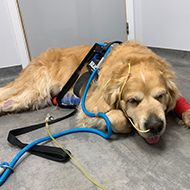
Dog owners urged to be vigilant.
Two further cases of Alabama Rot have been confirmed in the UK, taking the total since January 1 2022 to seven.
Anderson Moores Veterinary Specialists, which has been leading research into the disease, is collating information on all cases and reports in the UK. The two latest cases occurred in Ledbury, Herefordshire, and St Albans, Hertfordshire.
David Walker, American, RCVS and EBVS European specialist in small animal internal medicine, the UK's foremost authority on Alabama Rot, said: “We’re very sad to report two further cases of CRGV. Unfortunately, we find ourselves in the time of year when cases are most commonly identified.
“It is understandably worrying for dog owners; however, I must stress this disease is still very rare.
“We’re advising dog owners across the country to remain calm but vigilant and to seek advice from their local vets if their dog develops unexplained skin lesions.”
The latest two cases of Alabama Rot, also known as cutaneous and renal glomerular vasculopathy (CRGV) take the total number of confirmed cases in the UK to 286.
One of the latest cases was Marley, a golden retriever from Ledbury. His owner Rebecca Blackhouse said: “I first noticed something might be wrong when Marley began licking his back left paw. As I’ve always been aware of CRGV, I searched images of lesions and Marley’s didn’t look anywhere near as bad. In fact, it didn’t really look sore, so we wondered whether he’d cut it on a rock or something like that, as he loves the river.
“Then the following day his groin had swollen up to several times its original size and looked terrible, almost as if it was gangrenous. We took him straight to our local vets who were fantastic and referred us immediately to Anderson Moores.
“He stayed with Anderson Moores for a week and through much of that time he seemed stable.
“However, the duty vet then called us on the seventh day to say he was struggling to breathe, had fluid in his lungs and had taken a real turn for the worse. So, the kindest thing was to say goodbye. It’s such a brutal disease and moves so quickly.
“Marley would have been nine in August. We had him from just nine weeks old and he was a huge part of the family. We had our children after we got him, so they’ve only ever known life with Marley. He’s left us all with a huge void.”
Catarina Amorim, ACVIM Resident in small animal internal medicine, who cared for Marley, said: “Marley developed lesions on his prepuce, which is quite unusual, as well as ulcerated lesions in his groin and on his hind paw.
“He also developed generalised oedema (swelling), which resulted in the swelling his owners had originally seen, and pulmonary oedema (fluid in the lungs).”
Image (C) Anderson Moores Veterinary Specialists



 The WSAVA has invited veterinary professionals to a webinar on responsible antibiotic usage in dentistry.
The WSAVA has invited veterinary professionals to a webinar on responsible antibiotic usage in dentistry.